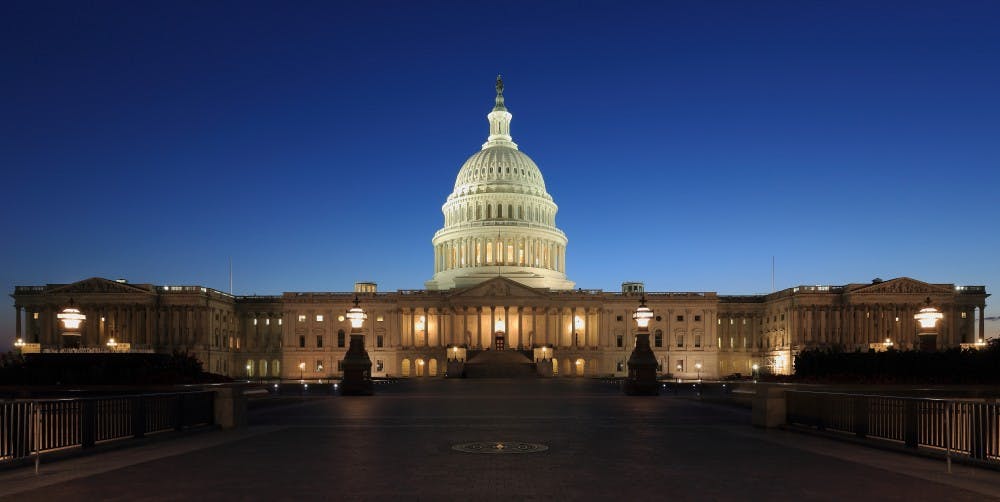The following is a guest contribution and reflects the author’s views alone. For information on how to submit an article to the Opinion section, click here.
You may have heard this truism, attributed to Mahatma Gandhi: “Anyone who says they are not interested in politics is like a drowning man who insists he is not interested in water.”
Throughout 2020, many of us developed political fatigue. American politics reared its partisan head in nearly every aspect of life: pandemic response, preferred media outlets, trust in the electoral process, response to social injustice, and even the act of draping a piece of fabric over your nose and mouth. After a year plagued by political turmoil, a break from it all sounds very appealing. However, as we saw on full display at the Capitol riot on Jan. 6, we are drowning. A reprieve won’t get us out of the water.
The pandemic crystallized America’s existing political ills, bringing myriad problems to public attention including racial injustice, healthcare inequality, unemployment, and misinformation. As we have seen so far, politicians alone cannot cure these maladies. Few states passed meaningful police reform in 2020. America’s coronavirus response was disjointed, as even leading government officials touted disproven conspiracy theories about the virus. Partisan disputes have hindered economic relief. Lawmakers across the aisle have for years talked about repealing or reforming Section 230, which grants social media platforms immunity for the content posted on their sites, but their delays have allowed echo chambers to worsen.
These shortcomings are not unprecedented. History shows that any successful movement for political change relies on contributions from various fields.
Andrei Sakharov used his position as a physicist to advocate against nuclear proliferation. His influence contributed to Former Soviet Premier Nikita Khrushchev’s willingness to sign the Limited Test Ban Treaty in 1963.
Florence Nightingale, a nurse and statistician, used data gathered from hospitals to push for healthcare reform.
In the United States, Sam Cooke’s song, “A Change is Gonna Come,” became an anthem for the Civil Rights Movement, providing hope and motivation for activists. Cooke also contributed to social change by refusing to perform at segregated venues.
At the height of the AIDS epidemic, the poster “Silence = Death,” designed by a collective of the same name, served as a rallying point for millions to seek policy change. The advocacy group ACT UP eventually adopted the artwork.
Just as we are all impacted by politics, we can all enact political change. Princeton has some of the future leaders in computer science, medicine, art, history, business, and many other fields. People in these professions will be impacted by politics as much as policymakers will. It is both timely and necessary for Princeton to increase course offerings that provide guidance on how to effectively engage with politics through various disciplines.
A number of departments, including Computer Science and Art, already provide courses exploring the intersection of their disciplines with politics. Those that have not yet developed such courses should follow their lead. The Pace Center for Civic Engagement’s “Service Focus,” which allows students to connect academic interests with community service, could serve as a model for a similar program geared toward political engagement.
College campuses are prime locations for political discussions no matter what your major is. But we need to consider how to bring that mindset beyond the theoretical fireside debates of Princeton’s dining halls and into our future occupations.

To make progress on any issue, tomorrow’s leaders will need to mitigate misinformation and polarization. As we saw with the Capitol riot, misinformation breeds real-life consequences. President Trump’s election fraud claims have been rejected by judges across the political spectrum. Still, the president’s continued assertions of fraud have spread on social media, leading protestors to storm the Capitol.
Polarization shapes our country’s response to nearly every issue. The ability for Americans to choose only media outlets that support their views — and the algorithms that reinforce this — have driven party stances to extreme opposites. For example, when protests broke out after the shooting of Jacob Blake by a police officer in Kenosha, Wis., a poll by research firm Ipsos found that 75 percent of Democrats supported the demonstrations, compared to only 7 percent of Republicans.
The cult of personality around President Trump reached an apex on Jan. 6, as crowds of people followed the president’s urging to “fight like hell” even after he denounced a number of Republican leaders — including Vice President Mike Pence — for not supporting his election fraud claims. Politicians on the left and right have thus far been unable to ameliorate the phenomenon of unwavering support for the president. While misinformation and polarization are issues themselves, they are particularly problematic because they are obstacles to progress in other areas.
Our current political woes require solutions from various fields. Aside from directly applying our respective talents to political engagement, we can all play a role in voting and advocacy. As we currently seek progress in America in the face of last week’s disheartening events, it is crucial to remember that the way in which we engage with politics matters.
We can either escalate the polarization and hostility in America or defuse it. There are times when a drowning person makes their situation worse by flailing about. While you cannot ignore the water around you, you also cannot let it unnerve you. If we rally our strength for strategic strides forward, perhaps we can make it ashore — or at least stay afloat.
Lily Olsen is a senior in the politics department. She can be reached at lolsen@princeton.edu.









